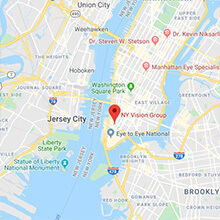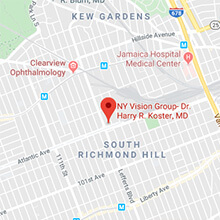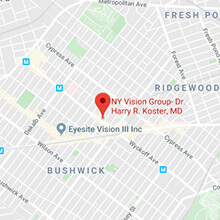 LASIK is the most advanced form of vision correction available today. At NY Vision Group, we specialize in providing Wavefront LASIK surgery to patients in the convenience of our office at 37 Murray Street in Manhattan.
LASIK is the most advanced form of vision correction available today. At NY Vision Group, we specialize in providing Wavefront LASIK surgery to patients in the convenience of our office at 37 Murray Street in Manhattan.
Dr. Harry Koster, our board-certified ophthalmologist, is one of the most experienced LASIK surgeons in New York, with 20 years of experience in New York. He has performed more than 35,000 LASIK surgeries and is dedicated to improving his patients’ vision.
If you are tired of contact lenses or eyeglasses and seeking improved vision, please take the LASIK self-test. You can also conveniently schedule a free consultation at our offices in Manhattan, Brooklyn, and Queens.
What is LASIK?
LASIK stands for laser-assisted in-situ keratomileusis which means to treat the cornea with a laser. It is a highly effective laser procedure used to correct vision problems such as nearsightedness (myopia), farsightedness (hyperopia), and astigmatism and is suitable for most low, moderate, and high prescriptions.
LASIK eye surgery was first performed in the United States in 1991 and was formally approved by the FDA in 1998. The procedure has quickly grown to be the most popular type of elective surgery in the world, with more than 28 million procedures performed.
LASIK is a two-step procedure that uses advanced laser technology to reshape the cornea, the clear front part of the eye. The purpose of the cornea is to bend (refract) light so it can reach the retina and be transmitted to the brain as visual information.
Some people have corneas that are irregularly shaped, which causes light to focus in front of the retina instead of on it. This results in blurry vision at varying distances, or what’s known as a refractive error. Refractive errors include nearsightedness, farsightedness, or astigmatism, all of which can be corrected during LASIK. As light enters the eye, the curve of the outer window, the cornea, bends it. If the cornea is too curved or too flat, the light will not be in focus on the retina at the back of the eye. LASIK permanently changes the curve of the cornea so that patients can see well with freedom from contacts or glasses.
NY Vision Group utilizes the WaveLight Ex 500 Laser, the most technologically advanced vision correction laser for all of its LASIK patients. In fact, NY Vision Group was the first practice in NYC to obtain this technology, giving us the longest experience with this laser. The laser uses wavefront technology to provide a customized treatment for each patient’s eyes. Wavefront technology is a combination of special software and equipment used to electronically scan a patient’s eyes before surgery. Each scan creates a highly detailed digital map of the cornea which is then used during treatment to customize the vision correction for the unique characteristics of each patient’s eye.
Watch the LASIK Process from Consultation to 20/20 Vision
Am I a candidate for LASIK?
 Although LASIK is one of the most advanced vision correction procedures available today, LASIK is still a surgical procedure. As such, all potential patients must undergo extensive pre-operative evaluation in either our Manhattan, Queens or Brooklyn office to determine if LASIK is an appropriate option. Furthermore, potential candidates must understand the benefits and risks of the procedure and have realistic expectations about the potential outcome.
Although LASIK is one of the most advanced vision correction procedures available today, LASIK is still a surgical procedure. As such, all potential patients must undergo extensive pre-operative evaluation in either our Manhattan, Queens or Brooklyn office to determine if LASIK is an appropriate option. Furthermore, potential candidates must understand the benefits and risks of the procedure and have realistic expectations about the potential outcome.
If Dr. Harry Koster or one of our other refractive surgeon determines that LASIK is not the procedure that best suits your needs, other procedures such as PRK, Refractive Lens Exchange, or phakic implant surgery, may be more appropriate for you. We can discuss each of these options with you and give you a fair estimate of the results you could achieve with them. You can begin the process of determining if you are a candidate by taking our LASIK self-test.
The Best Candidates for LASIK are:
- 18 years of age or older;
- have a stable prescription for the last year or two;
- have healthy eyes;
- have a sufficiently thick cornea, with normal curve and tear film ;
- have realistic expectations about the surgery’s outcomes and are willing to accept the potential risks, complications and side effects of the procedure;
- if wearing contact lens, discontinue use several days prior to the examination, (time depending on the type of contact lenses.)
Click here to take the self-evaluation test.
What are the Benefits of LASIK?
At NY Vision Group, we’re committed to providing top-quality LASIK eye surgery in Brooklyn, Tribeca, Richmond Hill and the surrounding area. LASIK offers numerous benefits that can dramatically improve your quality of life, including:
Clear Vision With Reduced Dependence on Visual Aids
LASIK can significantly reduce or eliminate your dependence on glasses and contact lenses. After healing from the procedure, many patients are able to enjoy clear, crisp vision without the hassle of corrective lenses.
Fast Recovery and Quick Results
One of the most appealing aspects of LASIK is its rapid recovery time. Most patients notice improved vision within 24 hours of the procedure, and many can return to work and normal activities within a day or two. The results of LASIK eye surgery are typically long-lasting, with many patients enjoying improved vision for years or even decades.
Improved Quality of Life
LASIK can significantly improve your overall quality of life. You’ll no longer need to worry about packing contact lens solutions for trips, dealing with foggy glasses, or struggling to see clearly while participating in sports. This newfound visual freedom allows you to fully engage in activities you might have previously avoided due to the constraints of visual aids.
Long-Term Cost-Effectiveness
While LASIK eye surgery requires an initial investment, it can be more cost-effective in the long run compared to the ongoing expenses of glasses, contact lenses, and related supplies. Over time, the money saved on these items can offset the cost of the procedure, making LASIK a smart financial decision.
Personalized Treatment
At NY Vision Group, we use advanced wavefront-guided LASIK technology to create a personalized treatment plan for each patient. This customized approach allows your LASIK surgeon to address even subtle vision imperfections, potentially providing you with better vision than you’ve ever had before, even with glasses or contacts.
Comfortable Procedure
LASIK is a relatively painless procedure that typically takes only about 15 minutes per eye. Most patients report little to no discomfort during and after the procedure, with many describing the experience as surprisingly easy and stress-free.
Enhanced Night Vision
Many LASIK patients report experiencing improved night vision following the procedure. This can be particularly beneficial for those who frequently drive at night or work in low-light conditions.
Boost in Self-Confidence
The increased freedom from glasses and contact lenses can lead to a significant boost in self-confidence. Many people who feel as though visual aids like glasses impact their appearance report feeling more confident after LASIK, as they are able to reduce their use of glasses. At NY Vision Group, we’re dedicated to helping you experience these life-changing benefits of LASIK. Our experienced LASIK surgeons use the most advanced technology to ensure the best results and patient satisfaction.
What happens before LASIK?
At NY Vision, we start by scheduling an initial evaluation with one of our board-certified LASIK surgeons to determine your candidacy. If you wear contact lenses, we will, for some days, request that you stop wearing contact lenses before the appointment.
During your appointment, you will be asked about your medical history, current medications, and allergies. A thorough exam will also be conducted to assess your prescription, corneal thickness, and shape, as well as your overall eye health. The surgeon will discuss the risks, benefits, and expectations for LASIK, as well as answer any questions you may have.
If you are approved as a candidate for LASIK, you will be asked to stop using cosmetics the day before surgery. It’s also important to arrange for transportation to and from your surgery, as well as your follow-up visit.
What happens during LASIK?
The procedure is performed using topical anesthetic eye drops and takes less than 5 minutes per eye. There is no pain during the procedure and patients are awake and comfortable. A thin hinged flap of the cornea is created, which is lifted back.

Once the flap is lifted, the surgeon applies a cool beam of light from the laser to reshape the cornea and correct the refractive error.
Finally, the corneal flap is positioned back into place. No stitches or sutures are necessary, as the flap fuses with the eye to act as a natural bandage.
What happens after LASIK?
The vast majority of patients see a dramatic improvement in their vision immediately following the surgery, followed by continued improvement over the next few days. A few patients experience dry eyes, sensitivity to light, or general irritation after LASIK, but these symptoms should improve within the first few days after surgery. Your doctor can prescribe eye drops or recommend a pain reliever to help with recovery.
It’s important not to rub your eyes, play contact sports, or wear makeup around the eyes immediately after LASIK. Your eyes need time to heal.
A follow-up visit will be scheduled after surgery and at regular intervals after that. Keeping your follow up appointments is important. In the vast majority of patients, the visual outcome is excellent. Nonetheless, LASIK is surgery and every precaution should be taken to ensure a safe and healthy result. The doctors at NY Vision Group will review the risks, benefits, and alternatives of LASIK with patients prior to the procedure. Patients should evaluate their options carefully, ask any questions they have, and if they do choose to have LASIK, follow all pre-operative and post-operative instructions.
Are there alternatives to LASIK?
If you are not a candidate for LASIK, there are other options available. We offer PRK and Epi-LASIK, LASEK, Refractive Lens Exchange (RLE) and premium lens implants. Dr. Koster and the staff at NY Vision Group will help decide which procedure is best for your vision and lifestyle.
Financing
Although LASIK is not typically covered by insurance, some insurance plans may cover part of the procedure or offer a discount. NY Vision Group will work with you to determine the status of your insurance coverage and to find a financing solution that fits your needs. We offer flexible, low monthly payment financing through Wells Fargo and Care Credit.
LASIK surgery, Manhattan
Tired of the hassle of glasses and contact lenses? Take our LASIK self-test to see if you qualify for laser vision correction!
Prefer an in-person consultation? Dr. Koster and his team of eye care experts will determine your candidacy at our state-of-the-art LASIK clinic in New York. Call (718) 575-7582 to schedule your consultation today. At NY Vision Group, your vision is our focus.




